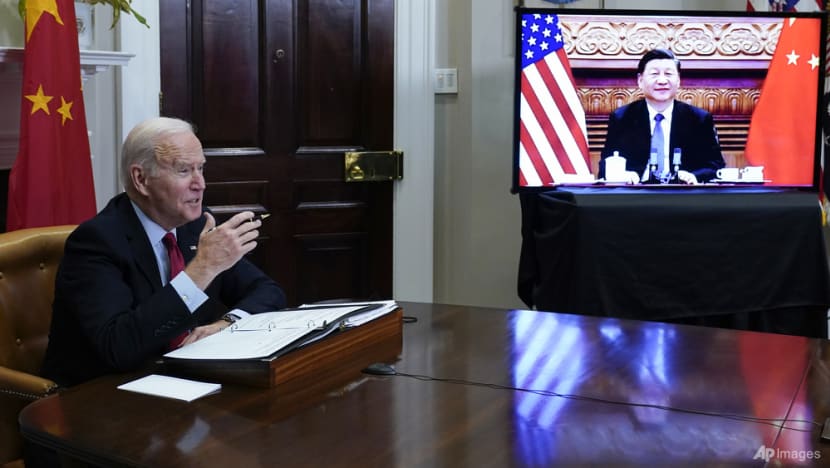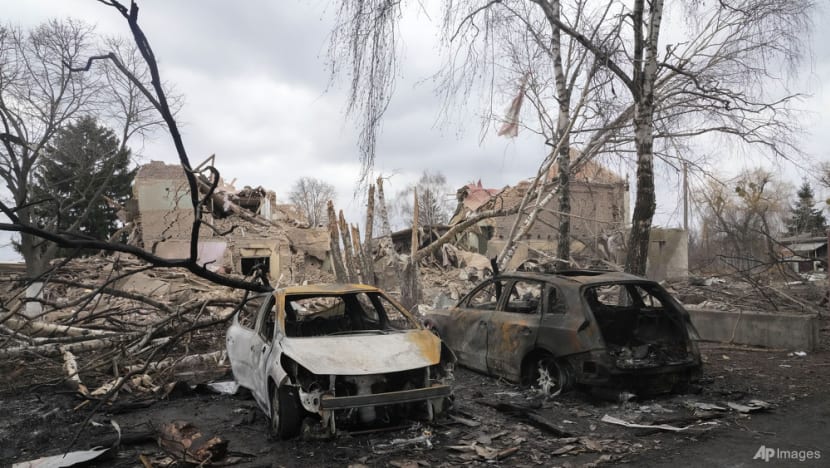Commentary: China should be troubled by these unprecedented US-led sanctions on Russia
A lack of a military response from the United States could inspire the hawks in Beijing but the sanctions implemented are also a warning, says Christian Le Miere.

President Joe Biden meets virtually with Chinese President Xi Jinping from the Roosevelt Room of the White House in Washington, Monday, Nov. 15, 2021. (AP Photo/Susan Walsh)
LONDON: In the wake of Russia’s invasion of Ukraine, attention has focused on the West’s reaction. While the United States and the North Treaty Atlantic Organization (NATO) have ruled out sending troops, several countries have responded with an onslaught of unprecedented sanctions and arms deliveries.
The effect has been twofold: To bolster Ukrainian resistance and weaken Russia’s economy.
Now, with US President Joe Biden announcing a ban on Russian oil imports on Tuesday (Mar 9), the heart of Russia’s commodity-fuelled economy is being targeted.
Moscow’s reaction has been unsurprisingly strident: Russian President Vladimir Putin had earlier called the sanctions “akin to an act of war”.
But the response by the US and its allies is having an effect not just on thinking in Moscow, but also in Beijing, which will have longer-term consequences for stability in East Asia.
The war in Ukraine has laid out just how far the West is willing to go militarily and economically against an aggressor in a conflict. And it’s a forerunner of what could occur in a Taiwan contingency.
Both Beijing and Taipei are watching the US response carefully. And there are warnings for both.
SWIFT AND UNPRECEDENTED SCALE OF ECONOMIC SANCTIONS
In general, the war in Ukraine has caught China in an awkward diplomatic position.

Beijing has to walk a tightrope: It is keen to support its burgeoning relationship with Russia - which the two sides described in February as a friendship with “no limits” and “superior to political and military alliances of the Cold War era”. At the same time, China will be mindful that state sovereignty is a principle held throughout its diplomatic rhetoric for decades.
More worrying for Beijing than its diplomatic dance will be the swift, comprehensive and cohesive economic response.
In just a few short days, the US was able to lead a broad coalition of European and other states and impose a host of punishing sanctions that were surprising in their rapidity and scope.
Beyond export controls or sanctions on individuals, the sanctions also closed large swathes of the world’s airspace to Russia and undermined the entire Russian financial system.
The removal of key Russian banks from SWIFT, sanctioning of some financial institutions and most notably the restrictions placed on the central bank, in a fell swoop denied Russia access to half of its US$640 billion reserves to support the economy and currency in just such a crisis.
Now, the US$1.5 trillion Russian economy is bracing for a deep recession: The rouble has tanked and Moscow’s stock market remains closed. Russia’s exports are drying up, both through a sharp drop in demand and countersanctions that have led to a swath of export controls, while Russian airlines have massively reduced their international flights.
All this should give some pause to policy hawks considering a Taiwan contingency. A similar sanctions regime against China could have devastating effects, leading to large-scale unemployment and currency crises. And ultimately hurt Beijing’s broader interests to expand its global influence.
Beijing might hold on to the hope that there will be far weaker political will to do so.
China’s economy is 10 times larger than Russia’s and is far more integrated into the global economy. The harm that a similar sanctions regime would have on Western economies would be much greater.
China’s hope would be that the pain such sanctions would exert on Western nations themselves would cause disunity, disagreement and weaken any potential sanctions regime.
But if Ukraine is any example, the fact that sanctions were raised so swiftly and with such unity, will trouble Beijing.
THE NUCLEAR DETERRENT?
On the other hand, the US and NATO’s refusal to enforce a no-fly zone will be heartening to those in Beijing who want to believe that Washington would be similarly cautious about committing forces to a Taiwan contingency.
Russia’s extensive nuclear arsenal is a significant factor in persuading the US that direct military involvement in the Ukraine conflict is a bad idea.
Beijing would also like to believe that such calculations will act as a restraint on concerted, unified action by the West. China has been undertaking a substantial modernisation of its nuclear arsenal, which may give pause to Western powers.
In reality, though, the US has had a stronger rhetorical and policy commitment to its role in the Taiwan Strait, particularly since the passing of the Taiwan Relations Act in 1979, than it has over Ukraine.
And the reticence to commit troops belies other forms of support the US and its allies have been providing. The US and European countries have supplied stores of military equipment, coming even from nations traditionally reticent to send arms to combat zones such as Sweden and Switzerland.
A senior US official told CNN this week that the US and NATO members have sent 17,000 anti-tank and 2,000 anti-aircraft missiles so far.
Using these supplies, Ukrainians have put up fierce resistance, harassing Russian supply lines and weakening their logistics. Rather than a quick victory, Russia is instead finding some offensives stalled and others having to grind out a bloody advance.
DIFFERENCES BETWEEN UKRAINE AND TAIWAN
The Western response to Russia’s invasion sends up some mixed signals, from Beijing’s and Taipei’s perspectives.
While there has been a coherent global economic response but refusal to deploy forces to Ukraine, it is not yet clear that there would be a similar reaction for Taiwan.
Significant differences exist between the Ukrainian and Taiwanese scenarios. The main one is this: Ukraine is an independent country whose sovereignty is recognised as a United Nations member. Taiwan has only formal diplomatic relations with 14 countries, with Nicaragua the most recent country to break ties with Taiwan to recognise “only one single China” in December 2021.
Amid this uncertainty and strategic ambiguity, it is no surprise that both China and Taiwan continue to invest in defence for an increasingly militarised and tense cross-strait situation. Just this week, Beijing announced a 7.1 per cent rise in its defence budget to US$230 billion.
For the moment, this ambiguity and the strong economic sanctions that have increasingly isolated Russia from the world should keep Beijing wary about how much more it could stand to lose in overt conflict.
But as the Ukraine war has demonstrated, large powers can make strategic miscalculations.
Christian Le Miere is a foreign policy adviser. He is also the founder and managing director of Arcipel, a strategic advisory firm based in London.


















